16 aug 2015
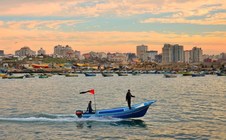
When Hamas demanded establishing a waterway as a precondition for a truce deal with Israel after the notorious Israeli 51-day-aggression on Gaza, some activists and factions mocked this rightful precondition; however, the pipe dream has become an achievable and fair demand.
Muin Rajab, a professor of Economics at al-Azhar University in Gaza, said that a seaport that connects Gaza with the external world is very important, and pointed out that Oslo accords endorse the Palestinian right to establish a waterway but the project hasn't been implemented because of the Israeli procrastination.
Rajab said in a statement to the PIC that establishing the waterway is a positive step and that it is the result of the Palestinians' steadfastness after the last Israeli aggression on the besieged coastal enclave.
He also highlighted the economic benefits of meeting the long-held Palestinian demand of establishing a seaport and that it will replace the Israeli-controlled Ashdod port.
The economist charged that the Israeli Occupation Authorities (IOA) imposes high taxes on the goods passing to the Palestinian territories especially to Gaza and that Gaza seaport will solve this issue which will positively affect the Palestinian economy.
Spokesman for the European campaign to end the siege on Gaza Rami Abdo pointed to the fact that the European Parliament adopted a decision supporting Gaza’s right of harbor and waterway in 2010.
The "Euro-Mediterranean with the participation of French and Dutch experts submitted a full plan of Gaza seaport project to the European Commission, the Turkish president Recep Erdogan, PA, and deputy head of Hamas's political bureau Ismail Haneyya," Abdo elaborated.
He posted on his Facebook page: "Many Palestinian factions in Gaza mocked Hamas's precondition for a ceasefire and considered it a distant dream. The precondition was also slammed by the PA."
Media talked about Israel's approval of establishing a watercourse connecting Gaza with Cyprus as a result of the talks between Hamas and former Middle East Quartet Envoy Tony Blair to lift the unjust siege imposed on Gaza and to stabilize the ceasefire.
Hamas refused to officially reveal specific results of the meetings with Blair; however, Hamas spokesman Sami Abu Zuhri said that his Movement has held meetings with various Palestinian factions including Fatah so as to brief them on the talks with the European and international parties including the meetings with Blair regarding breaking the Gaza blockade.
"Any proposal submitted to Hamas Movement will be presented to the Palestinian factions," Abu Zuhri stressed, and denied the groundless idea of establishing a state in Gaza or separating it from the other Palestinian territories.
Construction of Gaza seaport
According to the 2004 UNCTAD report, the deep-water Gaza seaport was planned to be built on a site some 5 kilometers south of Gaza city, around 200 kilometers west of Amman, and to service not only Palestinian traders but also Jordanian traders, providing them with an alternative transit corridor to Europe and North America.
Future plans include expanding the port's capacity to handle large vessels of up to 50,000 to 70,000 DWT, and linking its facilities to the neighboring ports of Port Said in Egypt, Ashdod, Beirut, and Cyprus.
In addition to the seaport, the project design also included other infrastructure and facilities, such as an electrical substation, communication system, water supply system, surface water drainage system, waste disposal facility, storage facilities, transportation plan, and access roads.
Phase 1 includes the construction of facilities such as a 200 meters cargo quay and a Ro-Ro terminal; water depth will be 11 meters to enable vessels of up to 30 000 DWT to enter the port. The port will also be supplied with a 730 meters breakwater.
Presumably, during this phase, loading and unloading will be performed by shipboard cranes. It will be recommended for the coming years to have mobile cranes bearing 10-30 tons each.
Phase 2 includes the ability to extend Phase 1 easily and without major investments with regards to maritime security premises so as to meet future needs in Gaza.
Phases 3 and 4 include the ability to extend the exterior parameter of the port to cope with the shipping process of the West Bank, Jordan, and other countries of the area.
The port area extends over 323 meters south of Sheikh Ejleen road up to the north of the coastal road south of Sheikh Ejleen village southwest of Gaza City.
Muin Rajab, a professor of Economics at al-Azhar University in Gaza, said that a seaport that connects Gaza with the external world is very important, and pointed out that Oslo accords endorse the Palestinian right to establish a waterway but the project hasn't been implemented because of the Israeli procrastination.
Rajab said in a statement to the PIC that establishing the waterway is a positive step and that it is the result of the Palestinians' steadfastness after the last Israeli aggression on the besieged coastal enclave.
He also highlighted the economic benefits of meeting the long-held Palestinian demand of establishing a seaport and that it will replace the Israeli-controlled Ashdod port.
The economist charged that the Israeli Occupation Authorities (IOA) imposes high taxes on the goods passing to the Palestinian territories especially to Gaza and that Gaza seaport will solve this issue which will positively affect the Palestinian economy.
Spokesman for the European campaign to end the siege on Gaza Rami Abdo pointed to the fact that the European Parliament adopted a decision supporting Gaza’s right of harbor and waterway in 2010.
The "Euro-Mediterranean with the participation of French and Dutch experts submitted a full plan of Gaza seaport project to the European Commission, the Turkish president Recep Erdogan, PA, and deputy head of Hamas's political bureau Ismail Haneyya," Abdo elaborated.
He posted on his Facebook page: "Many Palestinian factions in Gaza mocked Hamas's precondition for a ceasefire and considered it a distant dream. The precondition was also slammed by the PA."
Media talked about Israel's approval of establishing a watercourse connecting Gaza with Cyprus as a result of the talks between Hamas and former Middle East Quartet Envoy Tony Blair to lift the unjust siege imposed on Gaza and to stabilize the ceasefire.
Hamas refused to officially reveal specific results of the meetings with Blair; however, Hamas spokesman Sami Abu Zuhri said that his Movement has held meetings with various Palestinian factions including Fatah so as to brief them on the talks with the European and international parties including the meetings with Blair regarding breaking the Gaza blockade.
"Any proposal submitted to Hamas Movement will be presented to the Palestinian factions," Abu Zuhri stressed, and denied the groundless idea of establishing a state in Gaza or separating it from the other Palestinian territories.
Construction of Gaza seaport
According to the 2004 UNCTAD report, the deep-water Gaza seaport was planned to be built on a site some 5 kilometers south of Gaza city, around 200 kilometers west of Amman, and to service not only Palestinian traders but also Jordanian traders, providing them with an alternative transit corridor to Europe and North America.
Future plans include expanding the port's capacity to handle large vessels of up to 50,000 to 70,000 DWT, and linking its facilities to the neighboring ports of Port Said in Egypt, Ashdod, Beirut, and Cyprus.
In addition to the seaport, the project design also included other infrastructure and facilities, such as an electrical substation, communication system, water supply system, surface water drainage system, waste disposal facility, storage facilities, transportation plan, and access roads.
Phase 1 includes the construction of facilities such as a 200 meters cargo quay and a Ro-Ro terminal; water depth will be 11 meters to enable vessels of up to 30 000 DWT to enter the port. The port will also be supplied with a 730 meters breakwater.
Presumably, during this phase, loading and unloading will be performed by shipboard cranes. It will be recommended for the coming years to have mobile cranes bearing 10-30 tons each.
Phase 2 includes the ability to extend Phase 1 easily and without major investments with regards to maritime security premises so as to meet future needs in Gaza.
Phases 3 and 4 include the ability to extend the exterior parameter of the port to cope with the shipping process of the West Bank, Jordan, and other countries of the area.
The port area extends over 323 meters south of Sheikh Ejleen road up to the north of the coastal road south of Sheikh Ejleen village southwest of Gaza City.
13 aug 2015
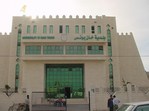
The Coastal Municipalities Water Utility (CMWU) has appealed to Gaza donors to urgently step in and work on assuaging the humanitarian crisis rocking Rafah city and the eastern villages of Khan Younis before it is too late.
CMWU said, in a statement, the water and sanitation services are on the verge of a total breakdown due to the exacerbating electricity crisis in Gaza, itself aggravated by the increasing problems in connecting power from Egypt.
CMWU warned that an outage is very likely to rock water utilities within the next 12 hours and the sanitation facilities within 48 hours.
The department appealed to the donor countries to urgently intervene and work on providing Rafah and the eastern regions of Khan Younis with a minimum of some 6,500 liters of diesel per day so as to provide civilians with the basic water and sanitation facilities and prevent an imminent environmental and humanitarian crisis pending serious work, by the energy authorities, on a more permanent solution.
CMWU said, in a statement, the water and sanitation services are on the verge of a total breakdown due to the exacerbating electricity crisis in Gaza, itself aggravated by the increasing problems in connecting power from Egypt.
CMWU warned that an outage is very likely to rock water utilities within the next 12 hours and the sanitation facilities within 48 hours.
The department appealed to the donor countries to urgently intervene and work on providing Rafah and the eastern regions of Khan Younis with a minimum of some 6,500 liters of diesel per day so as to provide civilians with the basic water and sanitation facilities and prevent an imminent environmental and humanitarian crisis pending serious work, by the energy authorities, on a more permanent solution.
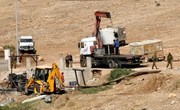
The Israeli occupation forces (IOF) on Wednesday afternoon launched a campaign in search for Palestinian water wells in different areas of Marj Ibn Amer, west of Jenin city.
Local sources reported that employees from the Israeli water authority escorted by soldiers from the military camp of Salem stormed and combed cultivated fields in the area and near the segregation wall to look for water wells.
They added that the soldiers interrogated the farmers on their own lands about the wells in the region, without stating if there were any kind of intended Israeli measures restricting the farmers' use of their wells.
In another incident, the Israeli water company Mekorot, the sole provider of piped water in the Israeli occupied territory and the West Bank, cut water to the cities of Nablus and Qalqiliya with no prior notice.
The Palestinian water authority stated on Wednesday that the Israeli company Mekorot suddenly cut water to all Palestinian communities in the northern West Bank areas, extending from the north of Nablus to Qalqiliya.
The water authority added it had tried to contact Mekorot to know the reason behind the water cut, but still no response from it.
Israel controls all water resources in the West Bank and imposes restrictions on the use of water by the Palestinians in their areas.
Local sources reported that employees from the Israeli water authority escorted by soldiers from the military camp of Salem stormed and combed cultivated fields in the area and near the segregation wall to look for water wells.
They added that the soldiers interrogated the farmers on their own lands about the wells in the region, without stating if there were any kind of intended Israeli measures restricting the farmers' use of their wells.
In another incident, the Israeli water company Mekorot, the sole provider of piped water in the Israeli occupied territory and the West Bank, cut water to the cities of Nablus and Qalqiliya with no prior notice.
The Palestinian water authority stated on Wednesday that the Israeli company Mekorot suddenly cut water to all Palestinian communities in the northern West Bank areas, extending from the north of Nablus to Qalqiliya.
The water authority added it had tried to contact Mekorot to know the reason behind the water cut, but still no response from it.
Israel controls all water resources in the West Bank and imposes restrictions on the use of water by the Palestinians in their areas.
12 aug 2015
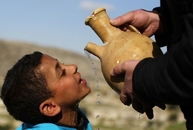
During the hottest month of the year, the Israeli occupation has cut off water from three more Palestinian villages in the occupied West Bank.
The villages of Qarawat Bani Hassan, Biddya and Sarta, in the West Bank cityu of Nablus, have received only a partial supply of water, leaving almost half of their residents without running water on certain days.
Mayor of Qarawat Bani Hassan, Aziz Aasi, said that the Israeli water company "Mekorot" had begun lowering the water quota for the villages, causing water pressure to drop.
“Following the decrease in water pressure, all the houses that are in the higher parts of the towns were left without a drop,” he said, according to Days of Palestine.
Rifat Mari was one of the residents left without water. “I have three children and I need to walk for kilometres to a spring that has a stream of water in order to fill bottles for the kids. We did not have showers for several days.”
The serious shortage, last week, led the village mayors to organise a protest outside the main water pump.
Israeli military troops, police,and Civil Administration officials arrived to try to restore calm and promised residents that the problem would be solved, but that was an attempt to supress protests calling for rein station water supply.
“Why do the Jewish settlers next to us get a quota of 300 litters per person, while we only get 70 litters per person?” asked Biddya Mayor Suleiman Taha. “If they get such an amount of water, then we should get the same amount.”
Meanwhile, the villages are being helped by neighbouring Palestinian villages, which send water tankers every few days, but this is not enough.
“The residents are furious at me,” said Aasi. “They think I have a button next to my bed that turns the village’s water on and off.”
Mekorot recently decided to adjust the water because of increased consumption, causing shortages in only the Palestinian villages, leaving them suffering.
The villages of Qarawat Bani Hassan, Biddya and Sarta, in the West Bank cityu of Nablus, have received only a partial supply of water, leaving almost half of their residents without running water on certain days.
Mayor of Qarawat Bani Hassan, Aziz Aasi, said that the Israeli water company "Mekorot" had begun lowering the water quota for the villages, causing water pressure to drop.
“Following the decrease in water pressure, all the houses that are in the higher parts of the towns were left without a drop,” he said, according to Days of Palestine.
Rifat Mari was one of the residents left without water. “I have three children and I need to walk for kilometres to a spring that has a stream of water in order to fill bottles for the kids. We did not have showers for several days.”
The serious shortage, last week, led the village mayors to organise a protest outside the main water pump.
Israeli military troops, police,and Civil Administration officials arrived to try to restore calm and promised residents that the problem would be solved, but that was an attempt to supress protests calling for rein station water supply.
“Why do the Jewish settlers next to us get a quota of 300 litters per person, while we only get 70 litters per person?” asked Biddya Mayor Suleiman Taha. “If they get such an amount of water, then we should get the same amount.”
Meanwhile, the villages are being helped by neighbouring Palestinian villages, which send water tankers every few days, but this is not enough.
“The residents are furious at me,” said Aasi. “They think I have a button next to my bed that turns the village’s water on and off.”
Mekorot recently decided to adjust the water because of increased consumption, causing shortages in only the Palestinian villages, leaving them suffering.
10 aug 2015
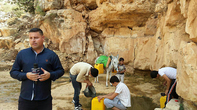
Rifat Mari said he had to walk a long way to a spring for water
Three West Bank villages partly cut off from running water during the hottest month of the year, angering residents who point out that the quota for neighboring Jewish villages is much higher.
Three Palestinian villages have been suffering from a water shortage for over a week during the hottest month of the year. The villages – Qarawat Bani Hassan, Biddya, and Sarta in the Nablus area – have received only a partial supply of water, leaving almost half of their residents without running water on certain days.
The three villages receive water from the Mekorot water company through COGAT's Civil Administration.
Qarawat Bani Hassan Mayor Aziz Aasi said that Mekorot had begun lowering the water quota for the villages, causing water pressure to drop.
"Following the decrease in water pressure, all the houses that are in the higher parts of the towns were left without a drop," he said.
Rifat Mari was one of the residents left without water. "I have three children and I need to walk for kilometers to a spring that has a stream of water in order to fill bottles for the kids. We haven't showered for several days."
The serious shortage last week led the village mayors to organize a protest outside the main water pump. Military troops, police, and Civil Administration officials arrived to try to restore calm and promised residents that the problem would be solved – but the water supply was not fully reinstated.
"Why do the Jewish neighbors next to us get a quota of 300 liters per person, while we only get 70 liters per person?" asked Biddya Mayor Suleiman Tah. "If they get such an amount of water, then we should get the same amount."
Meanwhile, the villages are being helped by neighboring Palestinian villages, which send water tankers every few days – but this is not enough.
"The residents are furious at me," said Aasi. "They think I have a button next to my bed that turns the village's water on and off."
COGAT said that Mekorot recently decided to adjust the water because of increased consumption, causing shortages in Palestinian and Israeli villages alike, and that the water supply had fully returned over the weekend.
Three West Bank villages partly cut off from running water during the hottest month of the year, angering residents who point out that the quota for neighboring Jewish villages is much higher.
Three Palestinian villages have been suffering from a water shortage for over a week during the hottest month of the year. The villages – Qarawat Bani Hassan, Biddya, and Sarta in the Nablus area – have received only a partial supply of water, leaving almost half of their residents without running water on certain days.
The three villages receive water from the Mekorot water company through COGAT's Civil Administration.
Qarawat Bani Hassan Mayor Aziz Aasi said that Mekorot had begun lowering the water quota for the villages, causing water pressure to drop.
"Following the decrease in water pressure, all the houses that are in the higher parts of the towns were left without a drop," he said.
Rifat Mari was one of the residents left without water. "I have three children and I need to walk for kilometers to a spring that has a stream of water in order to fill bottles for the kids. We haven't showered for several days."
The serious shortage last week led the village mayors to organize a protest outside the main water pump. Military troops, police, and Civil Administration officials arrived to try to restore calm and promised residents that the problem would be solved – but the water supply was not fully reinstated.
"Why do the Jewish neighbors next to us get a quota of 300 liters per person, while we only get 70 liters per person?" asked Biddya Mayor Suleiman Tah. "If they get such an amount of water, then we should get the same amount."
Meanwhile, the villages are being helped by neighboring Palestinian villages, which send water tankers every few days – but this is not enough.
"The residents are furious at me," said Aasi. "They think I have a button next to my bed that turns the village's water on and off."
COGAT said that Mekorot recently decided to adjust the water because of increased consumption, causing shortages in Palestinian and Israeli villages alike, and that the water supply had fully returned over the weekend.
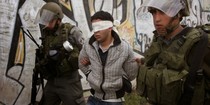
Israeli Occupation Forces (IOF) Monday overnight continued a wide campaign of kidnapping youths and children, in addition to handing out demolition orders.
PNN reoporter said that IOF have demolished a facility used for sheep in Thahriyya village that belongs to a citizen, and handed a citizen a demolition threat to the well he owns in Yatta.
IOF then moved to kidnap a number of youths from the Hebron district, including towns of Halhul, Bani-Nu’aim and Si’ir.
Among the arrested were three children from Si’ir village, aged 14.
The three were taken to the Ofer military court after they received notices to go to the Israeli intelligence on Sunday.
IOF did not give any reasons for the kidnap, and the number of detainees is still unidentified.
PNN reoporter said that IOF have demolished a facility used for sheep in Thahriyya village that belongs to a citizen, and handed a citizen a demolition threat to the well he owns in Yatta.
IOF then moved to kidnap a number of youths from the Hebron district, including towns of Halhul, Bani-Nu’aim and Si’ir.
Among the arrested were three children from Si’ir village, aged 14.
The three were taken to the Ofer military court after they received notices to go to the Israeli intelligence on Sunday.
IOF did not give any reasons for the kidnap, and the number of detainees is still unidentified.
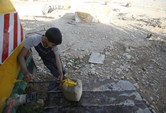
Israeli Occupation Forces (IOF) on Sunday blocked water tanks from reaching Bedouin families in Wadi al-Maleh in the northern Jordan Valley in absolute disregard to the severe hot weather.
Local sources revealed that the IOF soldiers stopped Palestinians’ tractors towing water tanks, blocked their traffic, and prohibited them to access the area.
The sources pointed out that the IOF deliberately pressures Bedouins in the region with the aim of forcing them to leave their homes in Wadi al-Maleh.
The Israeli forces prevent Bedouins from using water springs in the area and consider water transfer via tanks an offense for which drivers get penalized by confiscation and fines. Besides, the confiscated water tanks are usually transferred to Israeli military camps.
Local sources revealed that the IOF soldiers stopped Palestinians’ tractors towing water tanks, blocked their traffic, and prohibited them to access the area.
The sources pointed out that the IOF deliberately pressures Bedouins in the region with the aim of forcing them to leave their homes in Wadi al-Maleh.
The Israeli forces prevent Bedouins from using water springs in the area and consider water transfer via tanks an offense for which drivers get penalized by confiscation and fines. Besides, the confiscated water tanks are usually transferred to Israeli military camps.
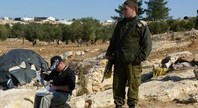
The Israeli occupation army on Sunday issued an order halting work on a water project funded by the European Union (EU) in Yatta town, south of al-Khalil city, and photographed a number of wells and structures in other nearby areas.
Anti-settlement activist Rateb al-Jabour told the Palestinian Information Center (PIC) that Israeli soldiers stormed Khellet al-Mayyeh village, south of Yatta, and handed its municipal chief a halt order against the construction of two EU-funded water tanks.
As usual, the Israeli army justified its measure by claiming that the project was unlicensed.
Jabour also said that soldiers photographed a number of water wells belonging to Palestinian citizens in the western area of Yatta as well as sheds, tents, and other wells in Umm al-Khair village, east of Yatta.
The activist condemned such Israeli measures against the Palestinian villagers in Yatta as aimed at forcing them to leave their native areas for the sake of settlement expansion activities.
Anti-settlement activist Rateb al-Jabour told the Palestinian Information Center (PIC) that Israeli soldiers stormed Khellet al-Mayyeh village, south of Yatta, and handed its municipal chief a halt order against the construction of two EU-funded water tanks.
As usual, the Israeli army justified its measure by claiming that the project was unlicensed.
Jabour also said that soldiers photographed a number of water wells belonging to Palestinian citizens in the western area of Yatta as well as sheds, tents, and other wells in Umm al-Khair village, east of Yatta.
The activist condemned such Israeli measures against the Palestinian villagers in Yatta as aimed at forcing them to leave their native areas for the sake of settlement expansion activities.
8 aug 2015
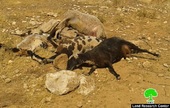
Dead cattle in Kfar Qaddoum
As an exceptionally hot summer heatwave continues to drain the region's water supplies, this week Israeli water company Mekorot took the situation to a new level with the villagers of Kafr Qaddoum when the company cut off the village's water supply.
The village is almost entirely dependent on agriculture, and the cutoff of water left hundreds of animals without water. The human population of the village numbers around 4,000, and only those who had water tanks or stored water bottles were able to have anything to drink during the Israeli water cutoff.
The animals which died include a number of cattle, and hundreds of chickens and other domestic birds.
According to the head of the village council of Kafr Qaddoum, located in the northern West Bank near Nablus, the Israeli company cut off the village's water with no warning or reason.
Hamzeh Jomaa, the village council head, said that he has been trying to contact Mekorot to find out why the water was cut and when it will return.
In the meantime, the farm-dependent village is likely to continue to lose livestock and crops as the excessive heat continues.
Mekorot pumps water from underground reservoirs on Palestinian-owned land, essentially stealing water from Palestinians and then selling it back to them at high prices.
The amount of water allocated to Israelis is nearly four times the amount provided to Palestinian residents. Just 70 liters a day is provided to Palestinians, even during heat waves such as the current one, and this is less than the 100 liters a day recommended as a minimum by the World Health Organization.
And the allocation also does not include agricultural uses, despite the fact that the majority of Palestinians are dependent on agriculture for survival.
As an exceptionally hot summer heatwave continues to drain the region's water supplies, this week Israeli water company Mekorot took the situation to a new level with the villagers of Kafr Qaddoum when the company cut off the village's water supply.
The village is almost entirely dependent on agriculture, and the cutoff of water left hundreds of animals without water. The human population of the village numbers around 4,000, and only those who had water tanks or stored water bottles were able to have anything to drink during the Israeli water cutoff.
The animals which died include a number of cattle, and hundreds of chickens and other domestic birds.
According to the head of the village council of Kafr Qaddoum, located in the northern West Bank near Nablus, the Israeli company cut off the village's water with no warning or reason.
Hamzeh Jomaa, the village council head, said that he has been trying to contact Mekorot to find out why the water was cut and when it will return.
In the meantime, the farm-dependent village is likely to continue to lose livestock and crops as the excessive heat continues.
Mekorot pumps water from underground reservoirs on Palestinian-owned land, essentially stealing water from Palestinians and then selling it back to them at high prices.
The amount of water allocated to Israelis is nearly four times the amount provided to Palestinian residents. Just 70 liters a day is provided to Palestinians, even during heat waves such as the current one, and this is less than the 100 liters a day recommended as a minimum by the World Health Organization.
And the allocation also does not include agricultural uses, despite the fact that the majority of Palestinians are dependent on agriculture for survival.
6 aug 2015
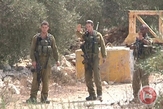
Dozens of Palestinian residents of the occupied West Bank village of Kafr Qaddum staged a sit-in, on Wednesday, to protest the Israeli national water company's cutting off its supply to the village, locals said.
Hamzeh Jumaa, the head of the village council, told Ma'an News Agency that the Israeli water company Mekorot cut off its supply, Sunday.
He said that the water supplies some 4,000 people living in Kafr Qaddum in Qalqilia, which he highlighted was an agricultural village.
He said that thousands of poultry birds have died due to a lack of water combined with extreme temperatures. Jumaa said that they have not received any answer from Mekerot as to why the water was cut off or when it will be brought back.
The council head added that Mekerot provides water to all Palestinian villages and illegal Israeli settlements in the surrounding area.
Israelis, including settlers, have access to 300 liters of water per day, according to EWASH, while the West Bank average is around 70 liters, below the World Health Organization's recommended minimum of 100 liters per day for basic sanitation, hygiene and drinking.
Kafr Qaddum has lost large swathes of its land to Israeli settlements, outposts and the apartheid wall, all illegal under international law.
According to the Applied Research Institute of Jerusalem, more than 10 percent of the village's land has been confiscated for the establishment of the settlements alone -- Kedumim, Kedumim Zefon, Jit, and Givat HaMerkaziz.
Residents of Kafr Qaddum stage regular protests, including a weekly Friday march, to protest land confiscations as well as the closure of the village's southern road by Israeli forces.
The road, which has been closed 13 years, is the main route to the nearby city of Nablus, the nearest economic center.
Israeli forces regularly use violent means to suppress the protests.
Hamzeh Jumaa, the head of the village council, told Ma'an News Agency that the Israeli water company Mekorot cut off its supply, Sunday.
He said that the water supplies some 4,000 people living in Kafr Qaddum in Qalqilia, which he highlighted was an agricultural village.
He said that thousands of poultry birds have died due to a lack of water combined with extreme temperatures. Jumaa said that they have not received any answer from Mekerot as to why the water was cut off or when it will be brought back.
The council head added that Mekerot provides water to all Palestinian villages and illegal Israeli settlements in the surrounding area.
Israelis, including settlers, have access to 300 liters of water per day, according to EWASH, while the West Bank average is around 70 liters, below the World Health Organization's recommended minimum of 100 liters per day for basic sanitation, hygiene and drinking.
Kafr Qaddum has lost large swathes of its land to Israeli settlements, outposts and the apartheid wall, all illegal under international law.
According to the Applied Research Institute of Jerusalem, more than 10 percent of the village's land has been confiscated for the establishment of the settlements alone -- Kedumim, Kedumim Zefon, Jit, and Givat HaMerkaziz.
Residents of Kafr Qaddum stage regular protests, including a weekly Friday march, to protest land confiscations as well as the closure of the village's southern road by Israeli forces.
The road, which has been closed 13 years, is the main route to the nearby city of Nablus, the nearest economic center.
Israeli forces regularly use violent means to suppress the protests.
5 aug 2015
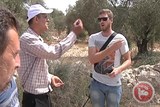
Dozens of Palestinian residents of the West Bank village of Kafr Qaddum staged a sit-in on Wednesday to protest the Israeli national water company cutting off its supply to the village, locals said.Hamzeh Jumaa, the head of the village council, told Ma'an that the Israeli water company Mekorot cut off its supply on Sunday.
He said that the water supplies some 4,000 people living in Kafr Qaddum in Nablus, which he highlighted was an agricultural village. He said that thousands of poultry birds had died due to a lack of water combined with extreme temperatures.
Jumaa said that they have not received any answer from Mekerot as to why the water was cut off or when it will be brought back.
The council head added that Mekerot provides water to all Palestinian villages and illegal Israeli settlements in the surrounding area. Israelis, including settlers, have access to 300 liters of water per day, according to EWASH, while the West Bank average is around 70 liters, below the World Health Organization's recommended minimum of 100 liters per day for basic sanitation, hygiene and drinking.
Kafr Qaddum has lost large swathes of its land to Israeli settlements, outposts and the separation wall, all illegal under international law.
According to the Applied Research Institute of Jerusalem, more than 10 percent of the village's land has been confiscated for the establishment of the settlements alone -- Kedumim, Kedumim Zefon, Jit, and Givat HaMerkaziz.Residents of Kafr Qaddum stage regular protests, including a weekly Friday march, to protest land confiscations as well as the closure of the village's southern road by Israeli forces.
The road, which has been closed 13 years, is the main route to the nearby city of Nablus, the nearest economic center.Israeli forces regularly use violent means to suppress the protests.
He said that the water supplies some 4,000 people living in Kafr Qaddum in Nablus, which he highlighted was an agricultural village. He said that thousands of poultry birds had died due to a lack of water combined with extreme temperatures.
Jumaa said that they have not received any answer from Mekerot as to why the water was cut off or when it will be brought back.
The council head added that Mekerot provides water to all Palestinian villages and illegal Israeli settlements in the surrounding area. Israelis, including settlers, have access to 300 liters of water per day, according to EWASH, while the West Bank average is around 70 liters, below the World Health Organization's recommended minimum of 100 liters per day for basic sanitation, hygiene and drinking.
Kafr Qaddum has lost large swathes of its land to Israeli settlements, outposts and the separation wall, all illegal under international law.
According to the Applied Research Institute of Jerusalem, more than 10 percent of the village's land has been confiscated for the establishment of the settlements alone -- Kedumim, Kedumim Zefon, Jit, and Givat HaMerkaziz.Residents of Kafr Qaddum stage regular protests, including a weekly Friday march, to protest land confiscations as well as the closure of the village's southern road by Israeli forces.
The road, which has been closed 13 years, is the main route to the nearby city of Nablus, the nearest economic center.Israeli forces regularly use violent means to suppress the protests.
2 aug 2015
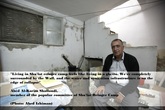
Shuafat Ridge (East Jerusalem) is cut off from the rest of the city by the Separation Wall built by Israel. This means that despite being part of the municipality of Jerusalem and residents having to pay city taxes, Shuafat suffers a near-total cessation of municipal services. This adds up to the impossibility of building legally houses and water networks due to Israeli restrictions.
The tens of thousands of Palestinians who live there only have access to around half the amount of water recommended by the World Health Organization – and they struggle to obtain even that. Shuafat Ridge’s population is estimated to reach 80,000 people. The antiquated water infrastructure is sufficient for just 15,000 people.
Last year most people in Shuafat went over a month without any running water – they survived by trucking water in from the West Bank and buying bottled water.
The government bodies refuse to fund any project that provides water to what they consider illegal structures. The only project to provide water to the area that has been accepted by the municipality will not serve the whole Palestinian community living in Shuafat and residents will have to pay for it themselves.
Whether in the West Bank or Jerusalem, Palestinians’ right to water has been reduced to a “right” to purchase water from Israel – which not only maintains control over all natural resources in the region but refuses to allow Palestinians the water connections that – on the contrary – are routinely granted to illegal settlements. For Palestinians in Shuafat Ridge, even this right is compromised by Israel’s goal of demographic dominance, the Israeli objective of maintaining a 70-to-30 ratio of Jews to Arabs in Greater Jerusalem.
Israel, which offers the products associated with its so-called water triumphs to the world, promising to liberate other regions from the threats of drought and scarcity, at home uses water to control Palestinians.
(Source: article by Charlotte Silver)
More information on denied access to water and sanitation for Palestinians in Jerusalem can be found in our photo booklet “Through the Camera Lens” available here.
The tens of thousands of Palestinians who live there only have access to around half the amount of water recommended by the World Health Organization – and they struggle to obtain even that. Shuafat Ridge’s population is estimated to reach 80,000 people. The antiquated water infrastructure is sufficient for just 15,000 people.
Last year most people in Shuafat went over a month without any running water – they survived by trucking water in from the West Bank and buying bottled water.
The government bodies refuse to fund any project that provides water to what they consider illegal structures. The only project to provide water to the area that has been accepted by the municipality will not serve the whole Palestinian community living in Shuafat and residents will have to pay for it themselves.
Whether in the West Bank or Jerusalem, Palestinians’ right to water has been reduced to a “right” to purchase water from Israel – which not only maintains control over all natural resources in the region but refuses to allow Palestinians the water connections that – on the contrary – are routinely granted to illegal settlements. For Palestinians in Shuafat Ridge, even this right is compromised by Israel’s goal of demographic dominance, the Israeli objective of maintaining a 70-to-30 ratio of Jews to Arabs in Greater Jerusalem.
Israel, which offers the products associated with its so-called water triumphs to the world, promising to liberate other regions from the threats of drought and scarcity, at home uses water to control Palestinians.
(Source: article by Charlotte Silver)
More information on denied access to water and sanitation for Palestinians in Jerusalem can be found in our photo booklet “Through the Camera Lens” available here.
